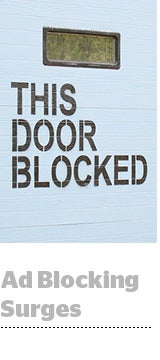Here’s today’s AdExchanger.com news round-up… Want it by email? Sign up here.
Chocka-ad-blocker
While everyone is freaking about the phaseout of third parties cookies and low IDFA opt-in rates, don’t forget – an estimated 40% of US adults already block online ads on PCs or phones. According to new data from Blockthrough reported by CNET, ad blocking is surging as millions seek more privacy, better security and, frankly, less annoyance. Although the number of people using ad blocking has remained mostly flat on PCs, it’s a totally different story on mobile devices, where ad blocking has doubled over the past five years – up from 282 million to 586 million by the end of 2020. Blockthrough also found that an increasing number of ad blockers are signing up for the Acceptable Ads program, which whitelists publishers whose ad experiences are deemed to be respectful and nonintrusive. The number of people using ad blockers that support Acceptable Ads grew 435% on mobile and 54% overall between the start of 2019 and the close of 2020.
Local TV Consolidation
Besides well-known national brands like Better Homes & Gardens and People, Meredith operates 17 local news stations in 12 markets, including Phoenix, Hartford, and Kansas City, Missouri. Well, Meredith is selling those stations to Gray Television for $2.7 billion so it can focus exclusively on its national brands. Selling the local media group will give the company time and money to “accelerate our digital growth and leverage our industry-leading first party data,” Meredith CEO Tom Harty said. Back in 2017, the FCC loosened its rules about how many local TV stations one company could own, which made consolidation among major players easier. In April, the Supreme Court upheld the loosening of those restrictions. Read on.
Like A Glacier Receding …
Mobile strategist Eric Seufert was in a mythbusting mood over the weekend, and in a blog post on Sunday, he killed a dream: “Like a glacier receding into the arctic waters, mobile ad spend can disappear,” he wrote. Now that Apple’s AppTrackingTransparency framework is live as part of iOS 14.5, mobile targeting and measurement are set to get a heck of a lot more challenging. And if the efficiency of ad spend decreases, SMB and direct response advertisers will, in turn, tighten their ad budgets. “Direct response advertising is undertaken on the basis of unit economics, not overall levels of spend,” Seufert said. So, even if consumer demand doesn’t change, performance marketers will shell out less because their spend will be less efficient. And guess who’s going to clean up? That’s right, it’s the good old walled gardens.
But Wait, There’s More!
The opening round of the NFL draft drew a collection 12.5 million viewers across ESPN, ABC and the NFL networks, per Nielsen – the second-best results ever for the event. The bad news? Viewership was down 18% from 15.3 million viewers last year. [MediaPost]
China’s main internet watchdog found that 33 mobile apps have broken data privacy rules by collecting data without consent, among other issues. Beijing has been clamping down on the country’s vast “platform economy.” [Reuters]
Q.Digital, publisher of digital media brands such as Queerty and Gay Cities, has relaunched Into, a publication originally founded by gay dating app Grindr. Into was shut down by Grindr in 2019. Q.Digital says Into will fill a gap in the LGBTQ+ media market by speaking to both the Gen Z and BIPOC community. [Digiday]
Epic Games didn’t sue Apple to get a big payout, but that’s because the lawsuit itself is an investment. And to rewrite Apple’s rules, Epic is spending a fortune. [The Verge]
GAID on with it: Here’s why Google holds the keys to web privacy in Africa and Asia. [Quartz]
Food52 acquired Scandinavian-style houseware company Dansk, founded in 1954. [release]
You’re Hired!
The 4A’s announced four executive leadership changes, including the addition of Ashwini Karandikar, who joins as the new EVP of media, tech and data. Long-time 4A’s vet Mollie Rosen is taking on a new role as EVP of strategy, insight and innovation. [release]
Ad intelligence firm Ad Lightening has appointed Dan Frechtling as its new CEO. [release]
ICYMI: Ad tech OG Neal Richter has left SpotX to join Amazon as director of ad science for its DSP. [Adweek]












